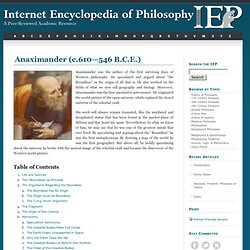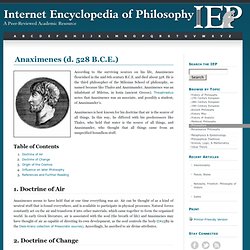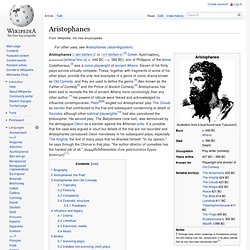

Anaximander Anaximander was the author of the first surviving lines of Western philosophy.

He speculated and argued about “the Boundless” as the origin of all that is. He also worked on the fields of what we now call geography and biology. Moreover, Anaximander was the first speculative astronomer. He originated the world-picture of the open universe, which replaced the closed universe of the celestial vault. His work will always remain truncated, like the mutilated and decapitated statue that has been found at the market-place of Miletus and that bears his name. Table of Contents 1. The history of written Greek philosophy starts with Anaximander of Miletus in Asia Minor, a fellow-citizen of Thales.
We also know very little of Anaximander’s life. 2. According to Aristotle and Theophrastus, the first Greek philosophers were looking for the “origin” or “principle” (the Greek word “archê” has both meanings) of all things. 3. A. B. C. A third argument is relatively long and somewhat strange. Anaximenes According to the surviving sources on his life, Anaximenes flourished in the mid 6th century B.C.E. and died about 528.

He is the third philosopher of the Milesian School of philosophy, so named because like Thales and Anaximander, Anaximenes was an inhabitant of Miletus, in Ionia (ancient Greece). Theophrastus notes that Anaximenes was an associate, and possibly a student, of Anaximander’s. Anaximenes is best known for his doctrine that air is the source of all things. In this way, he differed with his predecessors like Thales, who held that water is the source of all things, and Anaximander, who thought that all things came from an unspecified boundless stuff.
Table of Contents 1. Anaximenes seems to have held that at one time everything was air. 2. Given his doctrine that all things are composed of air, Anaximenes suggested an interesting qualitative account of natural change: [Air] differs in essence in accordance with its rarity or density. 3. 4. 5. Barnes, Jonathan. Aristophanes. Aristophanes (/ˌærɨˈstɒfəniːz/ or /ˌɛrɨˈstɒfəniːz/;[2] Greek: Ἀριστοφάνης, pronounced [aristopʰánɛːs]; c. 446 BC – c. 386 BC), son of Philippus, of the deme Cydathenaus,[3] was a comic playwright of ancient Athens.

Eleven of his thirty plays survive virtually complete. These, together with fragments of some of his other plays, provide the only real examples of a genre of comic drama known as Old Comedy, and they are used to define the genre.[4] Also known as the Father of Comedy[5] and the Prince of Ancient Comedy,[6] Aristophanes has been said to recreate the life of ancient Athens more convincingly than any other author.[7] His powers of ridicule were feared and acknowledged by influential contemporaries; Plato[8][9] singled out Aristophanes' play The Clouds as slander that contributed to the trial and subsequent condemning to death of Socrates although other satirical playwrights[10] had also caricatured the philosopher.
Biography[edit] ἡμῶν γὰρ ἄνδρες, κοὐχὶ τὴν πόλιν λέγω, Atomists.
Heraclitus. Milesians. Parmenides. Parmenides of Elea (/pɑrˈmɛnɨdiːz əv ˈɛliə/; Ancient Greek: Παρμενίδης ὁ Ἐλεάτης; fl. 5th century BCE) was an ancient Greek philosopher born in Elea, a Greek city on the southern coast of Magna Graecia.

He was the founder of the Eleatic school of philosophy. The single known work of Parmenides is a poem, On Nature, which has survived only in fragmentary form. In this poem, Parmenides describes two views of reality. In "the way of truth" (a part of the poem), he explains how reality (coined as "what-is") is one, change is impossible, and existence is timeless, uniform, necessary, and unchanging. In "the way of opinion," he explains the world of appearances, in which one's sensory faculties lead to conceptions which are false and deceitful. Pherecydes of Syros. Pluralists. Pythagoreans.